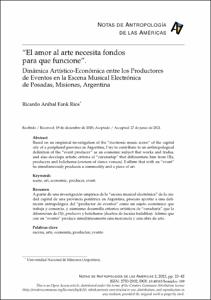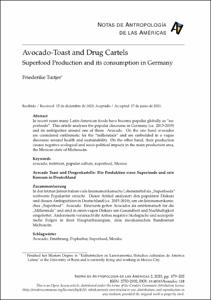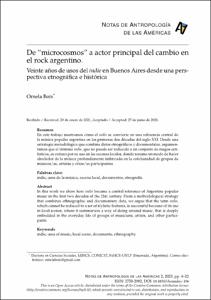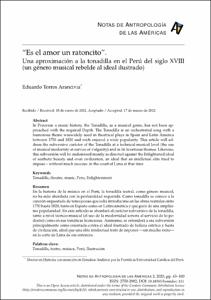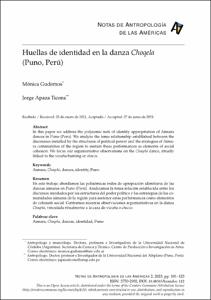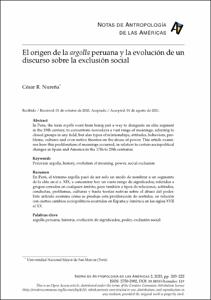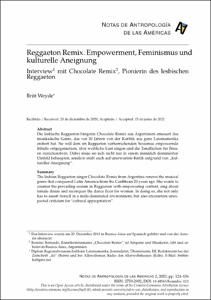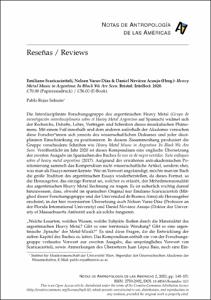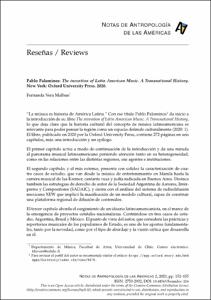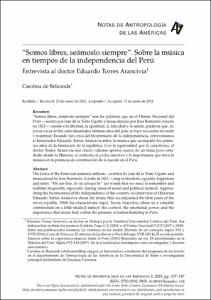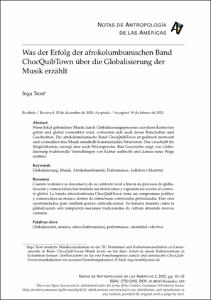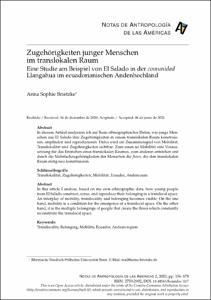2023, Nr. 2 - Dossier: Desigualdades y subversiones en las músicas de Latinoamérica: Browsing 2023, Nr. 2 - Dossier: Desigualdades y subversiones en las músicas de Latinoamérica by Resource Type "doc-type:article"
Now showing items 1-12 of 12
-
“El amor al arte necesita fondos para que funcione”: Dinámica Artístico-Económica entre los Productores de Eventos en la Escena Musical Electrónica de Posadas, Misiones, Argentina
Fank Ríos, Ricardo Aníbal (2023)Based on an empirical investigation of the “electronic music scene” of the capital city of a peripheral province in Argentina, I try to contribute to an anthropological definition of the “event producer” as an economic ... -
Avocado-Toast and Drug Cartels: Superfood Production and its consumption in Germany
Tuitjer, Friederike (2023)In recent years many Latin-American foods have become popular globally as “superfoods”. This article analyses the popular discourse in Germany (ca. 2015-2019) and its ambiguities around one of them: Avocado. On the one ... -
De “microcosmos” a actor principal del cambio en el rock argentino: Veinte años de usos del indie en Buenos Aires desde una perspectiva etnográfica e histórica
Boix, Ornela (2023)En este trabajo mostramos cómo el indie se convierte en una referencia central de la música popular argentina en las primeras dos décadas del siglo XXI. Desde una estrategia metodológica que combina datos etnográficos y ... -
“Es el amor un ratoncito”: Una aproximación a la tonadilla en el Perú del siglo XVIII (un género musical rebelde al ideal ilustrado)
Torres Arancivia, Eduardo (2023)In Peruvian´s music history, the Tonadilla, as a musical genre, has not been approached with the required Depth. The Tonadilla is an orchestrated song with a humorous theme waswidely used in theatrical plays in Spain and ... -
Huellas de identidad en la danza Choqela: (Puno, Perú)
Gudemos, Mónica; Apaza Ticona, Jorge (2023)In this paper we address the polysemic nets of identity appropriation of Aimara dances in Puno (Peru). We analyze the tense relationship established between the discourses installed by the structures of political power ... -
El origen de la argolla peruana y la evolución de un discurso sobre la exclusión social
Nureña, César R. (2023)In Peru, the term argolla went from being just a way to designate an elite segment in the 19th century, to concentrate nowadays a vast range of meanings, referring to closed groups in any field, but also types of ... -
Reggaeton Remix. Empowerment, Feminismus und kulturelle Aneignung: Interview mit Chocolate Remix, Pionierin des lesbischen Reggaeton
Weyde, Britt (2023)Die lesbische Reggaeton-Sängerin Chocolate Remix aus Argentinien erneuert das musikalische Genre, das vor 20 Jahren von der Karibik aus ganz Lateinamerika erobert hat. Sie will dem im Reggaeton vorherrschenden Sexismus ... -
“Somos libres, seámoslo siempre”. Sobre la música en tiempos de la independencia del Perú: Entrevista al doctor Eduardo Torres Arancivia
de Belaunde, Carolina (2023)“Somos libres, seámoslo siempre” son las palabras que en el Himno Nacional del Perú —escrito por José de la Torre Ugarte y musicalizado por José Bernardo Alzedo en 1821— cantan a la libertad, la igualdad, la felicidad y ... -
Was der Erfolg der afrokolumbianischen Band ChocQuibTown über die Globalisierung der Musik erzählt
Trost, Inga (2023)Wenn lokal gebundene Musik durch Globalisierungsprozesse aus ihren Kontexten gelöst und global vermarktet wird, verbreiten sich auch deren Botschaften und Geschichten. Die afrokolumbianische Band ChocQuibTown ist politisch ... -
Zugehörigkeiten junger Menschen im translokalen Raum: Eine Studie am Beispiel von El Salado in der comunidad Llangahua im ecuadorianischen Andenhochland
Brietzke, Anna Sophie (2023)In diesem Artikel analysiere ich auf Basis ethnographischer Daten, wie junge Menschen aus El Salado ihre Zugehörigkeiten in einem translokalen Raum konstruieren, empfinden und reproduzieren. Dabei wird ein Zusammenspiel ...


